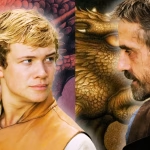“Prisoners: Reckoning (2026)” — Where Every Sin Has an Echo
- VanHoanh
- October 17, 2025

There are films that solve mysteries — and then there are those that become them. Prisoners: Reckoning is the latter — not a sequel, but a resurrection of guilt, grief, and the unbearable weight of memory. It doesn’t ask what happened. It asks what happens after.

Ten years have passed since the events that destroyed a family and hollowed out an entire town. Keller Dover (Hugh Jackman) emerges from years of self-imposed exile — not the man we remember, but the ghost of one. His face, carved with regret, tells more story than words ever could. Jackman’s performance transcends dialogue; his silence is volcanic. Every glance feels like a confession too late to matter.
Detective Loki (Jake Gyllenhaal) has aged differently. The twitch beneath his eyes has softened into stillness, but the burden remains. When a new child disappears — under circumstances cruelly familiar — Loki is forced to open a case that was never truly closed. What begins as procedure becomes pilgrimage, as both men circle back to the same moral abyss they once fell into.

Director Denis Villeneuve returns to the universe he once left haunted, and his hand is unmistakable. The screen is drenched in rain and regret; every drop feels like a tear the earth itself refuses to stop shedding. Villeneuve’s mastery lies not in showing pain, but in letting it breathe — long, slow, and suffocating.
Cinematographer Roger Deakins paints the film like a funeral lit by streetlights. The palette is all bruises — gray, amber, and storm-blue. Reflections blur into distortions; mirrors lie; puddles hold secrets more honest than people. Every frame feels like a question left unanswered, every shadow a soul waiting to be forgiven.
The narrative unfolds like a spiral rather than a line. Each clue leads not forward, but inward — into the recesses of guilt, memory, and the violence we commit in the name of love. There are no villains here, only people too human to survive what they’ve done. The film’s brilliance is in its refusal to draw lines between justice and revenge, salvation and damnation.

Jackman’s Keller is a study in deterioration — a man who prayed for redemption but only found the echo of his own rage. When he confronts the mirror of his past, we realize the real captivity was never physical. It was psychological, spiritual — the prison built from knowing you were both savior and sinner.
Gyllenhaal’s Loki becomes the film’s conscience. His investigation is no longer about the missing, but about the pieces of himself he’s lost along the way. His stillness hides a war, his calm hides collapse. In one devastating moment, he whispers, “We don’t find them. We just trade ghosts.” It’s the film’s thesis, spoken like a man who knows the cost of truth.
The soundscape is minimal — whispers of thunder, the hum of rain, the echo of a child’s voice where there should be none. Jóhann Jóhannsson’s score (posthumously reimagined through archived compositions) returns like a pulse beneath the storm — mournful, restrained, and infinite.

By its final act, Prisoners: Reckoning abandons structure altogether. It becomes confession — raw, poetic, and cruelly intimate. The camera lingers on Keller’s trembling hand as he drops a toy into a puddle. The water ripples, and in its reflection, the face that stares back isn’t his — it’s older, wearier, maybe divine. Or maybe it’s what remains when a man runs out of reasons to hide.
Prisoners: Reckoning isn’t about crime. It’s about conscience — the kind that keeps you awake long after the storm has passed. It’s about how guilt doesn’t fade; it transforms, reshapes, evolves — until it becomes faith’s twisted twin.
And when the final credits roll, there’s no catharsis, only the echo of a prayer unanswered:
“Some doors never close — they just stop waiting to be opened.”
Related movies:











